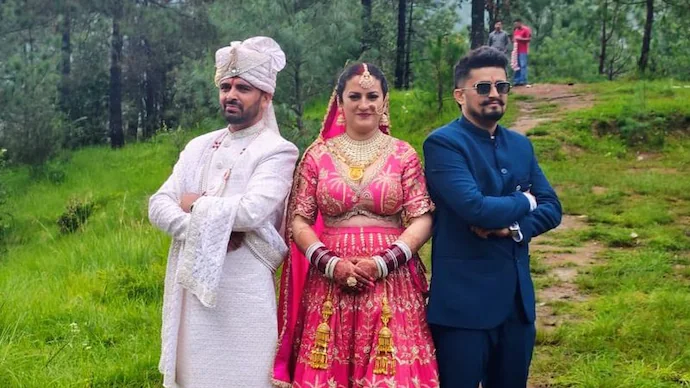Himachal Pradesh, India: In a rare and culturally significant event, two brothers from the Hatti tribe in India’s tourist-rich state of Himachal Pradesh married the same woman, following an age-old tribal custom of fraternal polyandry.
The wedding took place in the village of Shillai and lasted three days, beginning on July 12. The bride, Sunita Chauhan, expressed that the decision was made entirely by her own free will, adding that she feels proud of her choice. The grooms, Pradeep Negi (a government employee) and his younger brother Kapil Negi (employed abroad), both emphasized that the decision was mutual and grounded in their cultural heritage.
Pradeep said, “We openly embraced our tradition and are proud of it,” while Kapil added, “We are committed to giving our wife love and support within a strong, united family.”
Fraternal polyandry — where brothers share a single wife — is an ancient tradition among the Hatti tribe, originally rooted in the need to protect family farmland from being divided. By maintaining a joint family structure, this practice ensured that agricultural land remained intact and well-maintained.
Local elders explained that such marriages are usually discreet, though accepted by the community. Only a few such unions are reported these days; in the past few years, five similar marriages have taken place in the Trans-Giri region of Sirmaur district.
Kundan Singh Shastri, General Secretary of the Kendriya Hatti Samiti, described this custom as a gift from the ancestors. He said the tradition was established to protect family land from fragmentation and to ensure cooperation among brothers. In larger families with more men, such arrangements were seen as more secure and practical for land management.
The wedding rituals included a traditional ceremony called Sainj, where a priest sprinkles water on the bride and grooms while chanting hymns and offering prayers for a happy life.
This marriage is a rare but vivid example of an enduring tribal tradition in India, where relationships are sometimes viewed through a different social lens. However, with the rise of education and economic development, such practices have become increasingly rare and are gradually fading.
News Alert Urdu has this story in Urdu. Click on the link















